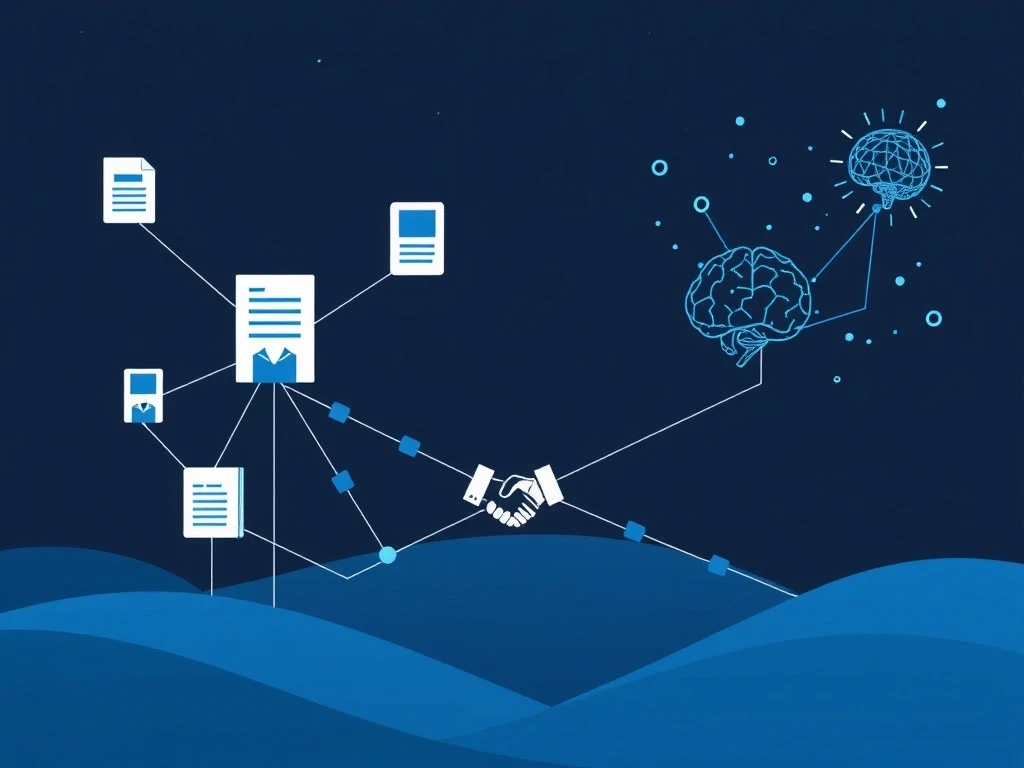Revolutionary **Blockchain-Based Identity** Transforms HR: Navigating AI-Generated Applications with Confidence

The crypto and Web3 sectors thrive on innovation. Yet, a growing challenge now threatens its core: the deluge of AI-generated applications. This new wave of sophisticated, yet often hollow, job applications is overwhelming HR departments. It makes genuine talent harder to spot. However, a powerful solution emerges from within the blockchain ecosystem: blockchain-based identity. This technology promises to restore trust and efficiency to the hiring process.
The Alarming Rise of AI-Generated Applications in HR Hiring
Today’s global hiring landscape undergoes rapid transformation. Job seekers increasingly leverage generative AI tools. They draft compelling cover letters and tailor resumes. Some even simulate interview prep sessions. Moreover, agentic AI solutions now auto-apply to thousands of roles within minutes. Employers face an unprecedented flood of applications. These documents appear polished, persuasive, and highly tailored. Yet, they frequently lack any real signal of effort, capability, or authenticity. When anyone can produce a high-quality application with simple AI prompts, the traditional cover letter loses its value. It ceases to signal genuine intent or enthusiasm. Instead, it becomes a standardized output. Hiring managers now review inboxes filled with slick, personalized applications. Many of these feel strangely similar. This creates a significant problem: if everyone sounds qualified on paper, how can HR discern actual skills? The challenge shifts from writing prowess to proving real-world delivery. The demand for robust verification in HR hiring has never been higher.
Why Traditional Trust Systems Fail Against AI
Traditional hiring has long relied on a fragile trust system. Resumes, references, and academic degrees serve as primary signals. However, these have always been weak proxies for actual competence. Job titles can be inflated. Educational achievements are often overstated. Past work experience might be exaggerated. AI technology further blurs these lines. It cloaks unverifiable claims in artificial eloquence. For fast-paced, remote-native industries like crypto or decentralized autonomous organization (DAO) ecosystems, the stakes are exceptionally high. There is often limited time for deep due diligence. Trust is extended quickly, often informally. This practice becomes particularly risky in pseudonymous, global environments. More HR tooling or advanced AI detection methods alone cannot solve this fundamental issue. Instead, a stronger foundation for trust itself is urgently needed. The current system simply cannot withstand the onslaught of sophisticated AI-generated applications.
Blockchain-Based Identity: A Robust Solution for Verifiable Credentials
Consider a hiring manager attempting to verify work history, social handles, or on-chain contributions. Current decentralized identity (DID) systems help prove a person is human. They confirm existence, not bot status. This initial step is certainly useful. However, DIDs do not address the deeper layer: what has this individual actually done? A new frontier is now emerging. This frontier allows professional history, credentials, and contributions to be verified and made portable. It moves beyond simple existence checks. It involves codifying experience. Thus, an individual’s reputation builds on provable actions, not merely stated claims. This system offers a compelling path forward. The core concept here is verifiable credentials, providing irrefutable proof of skills and achievements.
The Power of On-Chain Employment and Zero-Knowledge Proofs
In this innovative model, a resume transforms into a programmable asset. It is no longer a static PDF document. Instead, it becomes something dynamic. It can evolve, be queried, and even be privately verified. Users retain control over how much detail they reveal and to whom. This control is facilitated by tools like zero-knowledge proofs (ZKPs). ZKPs allow individuals to prove a statement’s truth without revealing the underlying information. Some might perceive this approach as overly invasive. Yet, in practice, especially within Web3, many serious contributors already operate through pseudonymous identities. These identities are built on provable actions, not just job titles. DIDs brought us to “real humans.” Verifiable credentials and reputation systems elevate us to “real contributors.” This fundamental shift deserves significant attention. On-chain employment provides immutable records of professional history, offering unparalleled transparency and trust.
From HR Filters to Smart Contract Gates: A New Era for HR Hiring
As reputation becomes programmable, entire industries stand poised for reshaping. Grants, hiring rounds, and even token sales could all utilize provable credentials as filters. Guesswork about qualifications or compliance becomes obsolete. It is impossible to fake a pull request successfully merged into a core repository. Similarly, one cannot pretend to have completed a course linked to a non-fungible token (NFT) issued by a smart contract. This innovative approach makes trust composable. It means trust can be built directly into protocols and platforms by default. Today, verifiable elements include contributions, learning histories, and various credentials. Soon, entire work histories could reside on-chain. This creates an unparalleled level of transparency and accountability for HR hiring. Such a system effectively filters out the noise from AI-generated applications.
Securing the Future of HR Hiring with Blockchain-Based Identity
The proliferation of AI-generated applications represents a symptom of a larger trust breakdown. For too long, we accepted unverifiable self-reporting as the default standard in hiring. Now, we confront the significant consequences of this acceptance. Blockchain-based identity and credential systems offer a robust path forward. Individuals can definitively prove their work. Consequently, hiring decisions can rely on verifiable data, not subjective guesswork. We must stop equating polished language with concrete proof of skill. If hiring—and broader reputation systems—are to withstand the coming AI wave, rebuilding the foundation of trust is paramount. On-chain employment credentials provide a compelling and secure starting point for this essential transformation. This ensures a future where genuine talent is recognized and rewarded.







